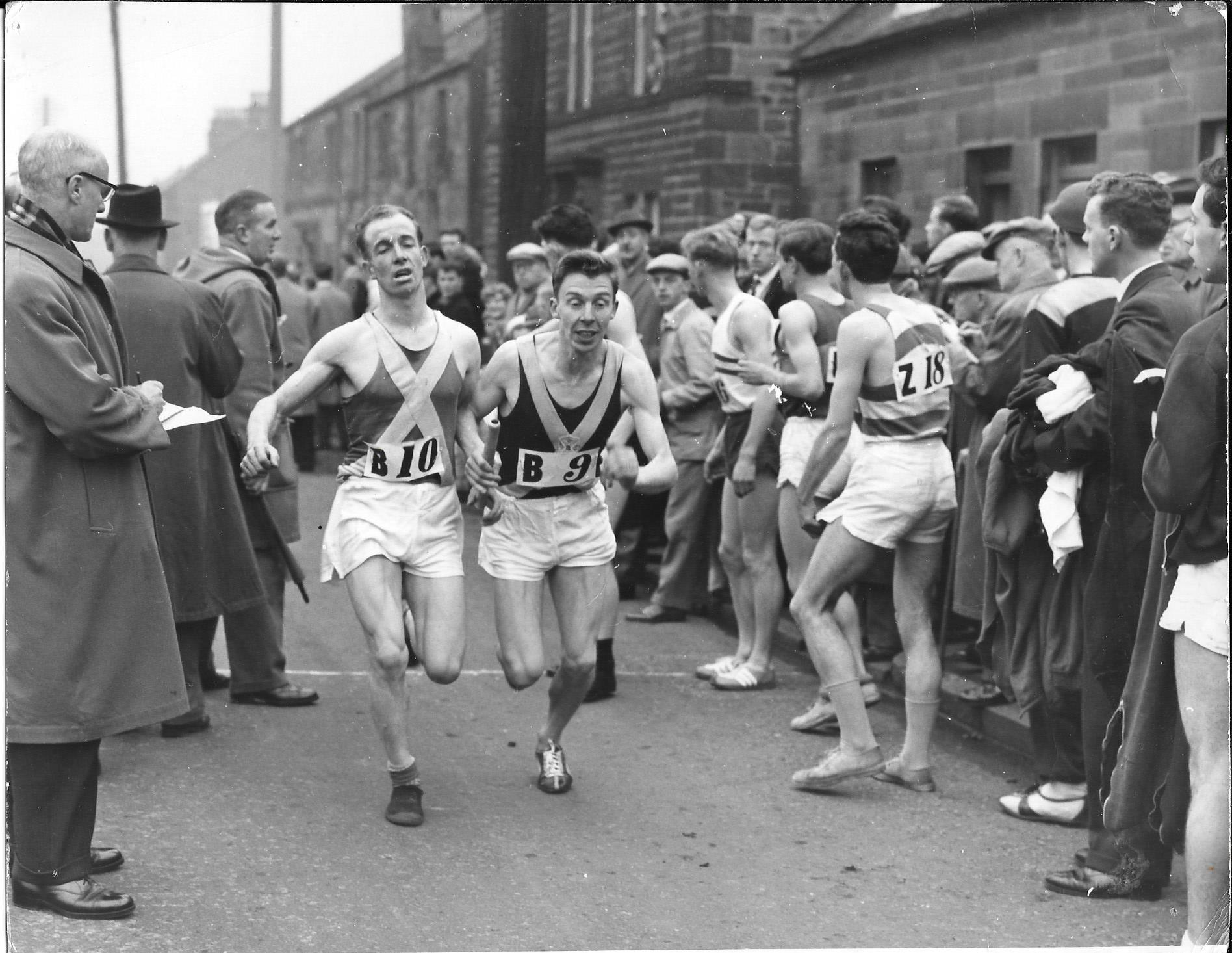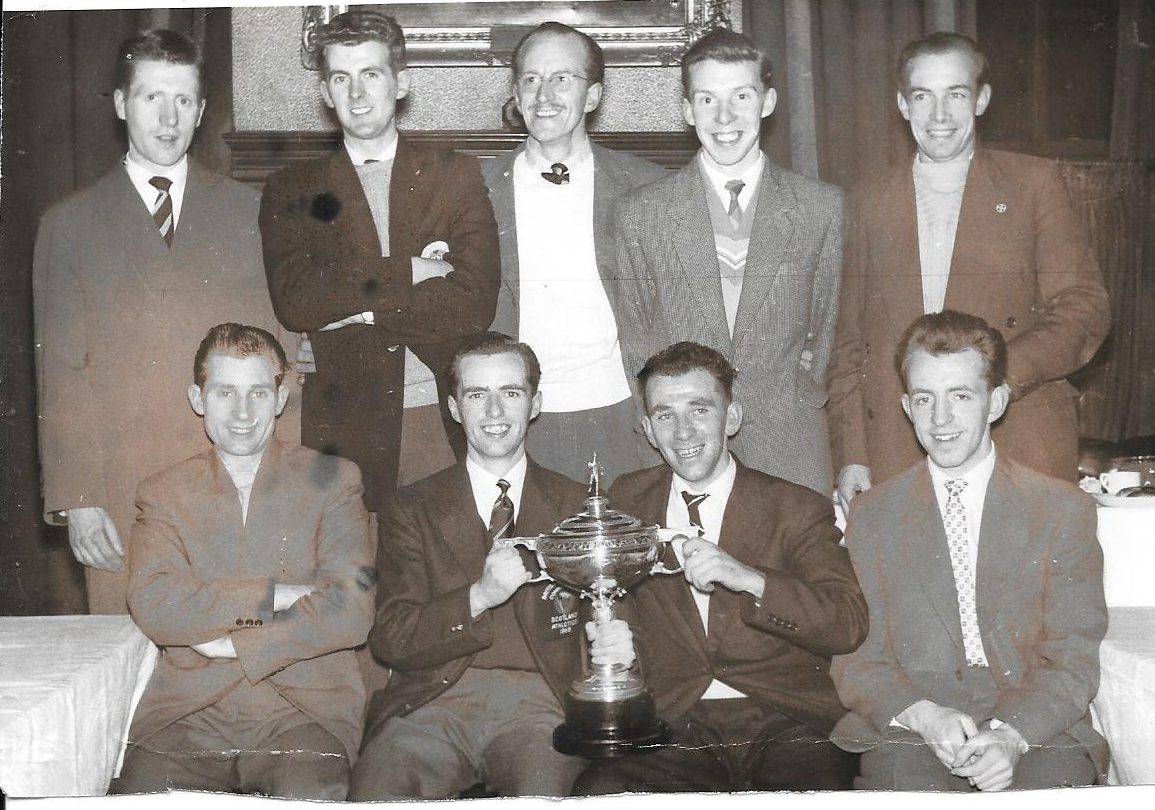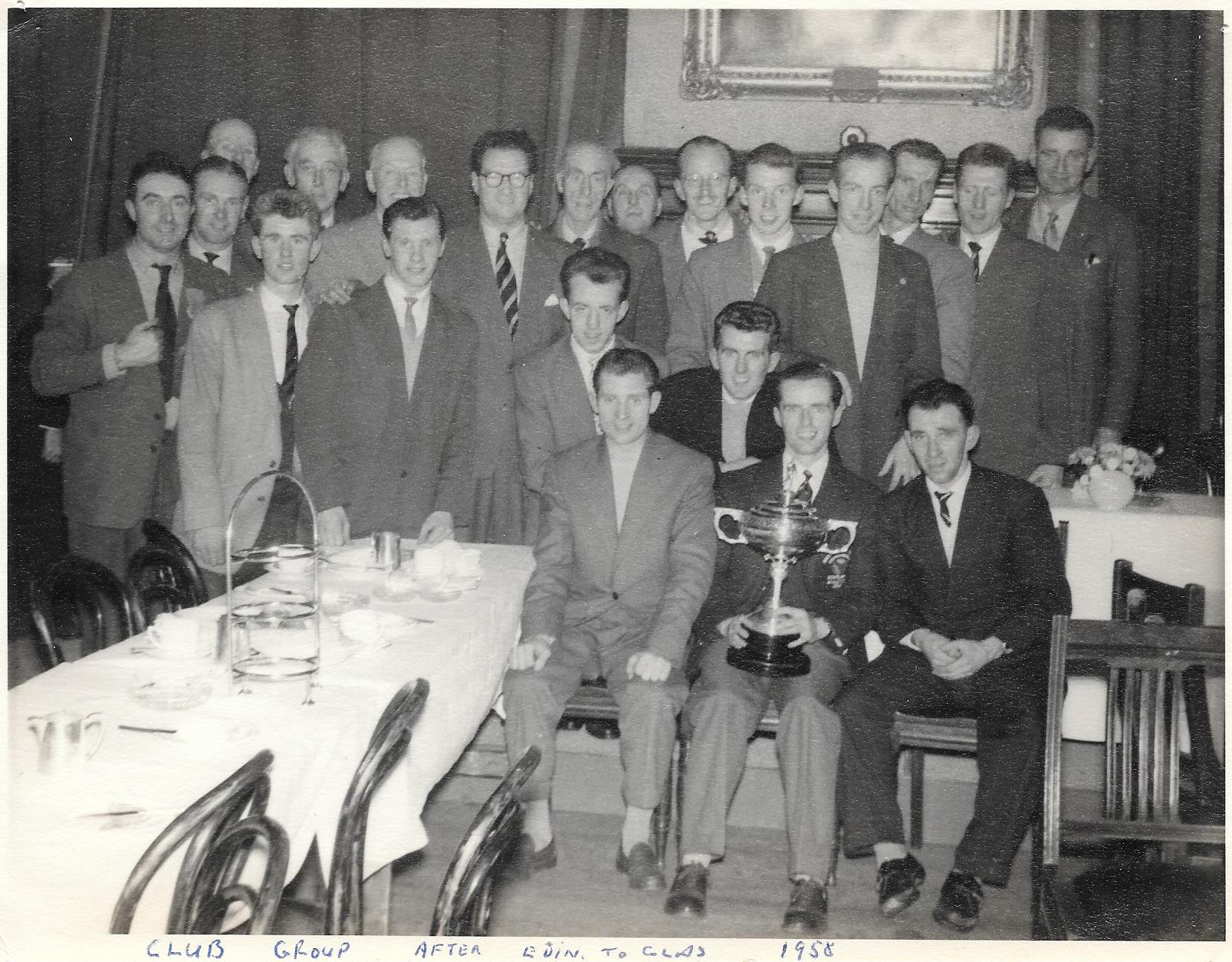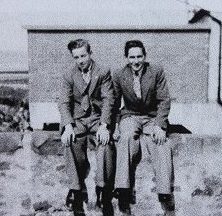.
Bert Irving, B10, hands the Edinburgh to Glasgow baton to Jim Irvine, while Victoria Park, Shettleston and Edinburgh Southern Harriers look anxiously for their runners to come in sight.
Bert Irving was one of the country’s best distance runners at a time when the country was blessed with a host of talented men. When Bert was running the top teams in the country were Shettleston Harriers, Victoria Park AAC and Bellahouston Harriers and there was not a lot between them. Individuals such as Ian Binnie, and Andy Forbes of Victoria Park, Joe McGhee and Graham Everett at Shettleston, Joe Connolly and Harry Fenion in his own Bellahoston Harriers club plus a whole host of runners such as Alastair Wood of Aberdeen were there doing battle. Bert was different – he didn’t live in any of the big cities so facilities were scarce, he consequently didn’t have a pack to train with which was also a decided disadvantage. But he did have two things that all top sportsmen must have – the desire to do well and targets to aim at. He lived in one of the least accessible parts of Scotland – Drummore in Galloway – at a time when there were very few cars on the road and public transport, while available, was complicated and required several changes en route. And of course, he was blessed with a talent for the sport.
There was no mention of ‘R Irving, Stranraer’ in any year up to season 1956/57 when he appeared in the South Western District Championships as finishing sixth in the Senior event. He was the only Stranraer runner, and the club had no teams out in any age group for many years up to that point. By the time of the National at Hamilton that season he was a Bellahouston Harrier and a scoring member of the team that finished second. The club runners in order of finishing were 1st. Harry Fenion, 2nd. Joe Connolly, 22nd Dick Penman, 23rd Bert Irving, 33rd Jim Irvine, 44th. Des Dickson From then on there was only ever one club associated with Bert Irving. Strangely enough he did not do much track running although in the SAAA Championships on 21st June he ran in the 6 miles, where he was fourth in 31:50.6 behind Andy Brown, Joe Connolly and Charlie Fraser (30:54.2). His winter season began with the Edinburgh to Glasgow relay in November where he ran the fifth stage and turned in the second fastest time for the team which finished second. Then on January 25th, 1958, he ran in the Midland District Championship where he was 15th. The club team again finished second. They then ran in the most prestigious race in the calendar – the Scottish National championship at Hamilton. Places this time were 6th. Connolly; 8th. Fenion; 9th. Dickson; 15th Nelson, 20th Irving, 38th Irvine. Individual positions were different but the team position was again second.
By 1958/59 Bellahouston was a club whose young team had matured and whose top runners were a match for any on the road or over the country. When the first major championship of the season came up, the Midland District relay, they won it. Colin Shields in his official history of the Cross-Country Union says: “Bellahouston Harriers, who had been so near success in past years, finally achieved the break through they deserved. They won the Midland relay for only the second time in the history of the race as Des Dickson (Bellahouston) and Bill Kerr (Victoria Park) led the field on the opening lap. The Bellahouston runners Bert Irving, Harry Fenion and Joe Connolly ran away from their rivals to win by 250 yards.”
Less than a month later, in November, the club confirmed their outstanding form when they won the Edinburgh to Glasgow eight stage relay. Shields again: “Bellahouston Harriers, whose young team had finished second and third in the preceding years, completed their full set of medals when upsetting the post-war monopoly set up by Victoria Park and Shettleston Harriers. Their first victory since 1938 was not achieved easily as Victoria Park and Shettleston exchanged the lead over the first half of the race. Once Dick Penman took the lead on the fifth stage and Joe Connolly kept Bellahouston’s lead after a struggle with Alastair Wood (Shettleston) and Ian Binnie (Victoria Park) on the long sixth stage, good runs by Des Dickson and Ramsay Black brought Bellahouston home to victory in 3 hours 49 minutes 29 seconds, fully 250 yards ahead of Shettleston Harriers.” It was a triumph to savour – the Victoria Park team in particular had been the team to beat on the roads with their many top class runners seeming to prefer the road to the mud, while Shettleston was arguably the better team over the country with both teams seeming to monopolise the major championships between them Bert ran on the very tough second stage where took over third and kept the team in close contention by holding the position and handing over in third.
At the start of 1959, the club was second to Shettleston in the District championship , beaten by only nine points before the major championship of the season. In the National at Hamilton on 28th February the Bellahouston team finishing order was 3rd Irving; 7th Connolly; 17th Dickson; 33rd Irvine; 45th Black; 52nd Penman and the team finished third. The Glasgow Herald merely reported the facts as follows.
“AJ Wood (Shettleston Harriers and RAF) was in excellent form on Saturday in the national senor nime mile championships at Hamilton and won by 33 sec. from J McLaren (Victoria Park AAC) with R Irving (Bellahouston Harriers) third, six yards behind McLaren. The holder of the title, AH Brown Motherwell YMCA was eleventh, nearly two minutes behind the winner.”
This excellent run earned Irving selection for the international held that year at Pontcanna Field, Cardiff where he finished 60th.
The winning Edinburgh to Glasgow team consisted of Goodwin, Irving, Irvine, Fenion, Penman, Dickson, Black. Bertie is on the right in the back row.
Into season 1959/60 and he missed the McAndrew Relay at Scotstoun and the club three miles championship but when Bellahouston Harriers had the first three teams in the Renfrewshire relays, Bert Irving was in the third team. It was a cautious selection and not a reflection of the selectors estimate of his abilities. The winning team was composed of Cowan, Penman, Fenion and Docherty, the second team was W Goodwin, Dickson, Irvine and Wilson, while the third team was Irving, Fraser, Gordon and McLean. But times don’t lie and Bert Irving had the third fastest time – he was quicker than three of the first team, only Harry Fenion being faster, and Willie Goodwin in the second team was one single second quicker than Irving. Despite the absence of any track times from that summer, he had lost none of his sharpness. In the Edinburgh to Glasgow they finished only six seconds slower than in 1958 but were second to Shettleston. Bert ran on the second stage – the stage where almost all of the top runners ran – and after taking over in seventh place from Goodwin and pulled up three places to fourth for the club. Over the country the next big championship was the Midland District at Renton in Dunbartonshire. Graham Everett won for Shettleston with the top Bellahouston men being Joe Connolly (third) and Bert Irving (fifth) leading the club to second place. The National championship was held at Hamilton again and there were two cub men in the first half dozen: Connolly was fourth, and Irving fifth. The rest of the counting runners for the club were Black 13th, Gordon 18th, Mercer 37th and Dickson 40th and the result of the team race was a second place behind Shettleston, Bert’s run won him his second international vest with the international being held over the same course at Hamilton. On the day Bert finished 41st and was a scoring runner for the Scottish team.
The winter of 1960/61 saw even less of Irving than the previous year – he missed the short relays including the Renfrewshire race where the club had first and second teams, and then he also missed he Edinburgh to Glasgow in November and the District championships in January 1961.
Nor was he out in the National at Hamilton. The team position was fifth which was indeed a creditable position in the premier national cross-country championship but it was the first time for some years that they had finished out of the medals. Finishing positions were Connolly 1st, Irvine 18th, Black 38th, Gordon 76th, Wilson 121st, Wright 128th. It had been a winter of disappointment for Irving, and for the Bellahouston team, given that he missed all significant races between October and March.
In season 1961/62 his first appearance was in the Edinburgh to Glasgow Relay where the debates of where to run each man to get the best out of them and what was the best order for the team, bearing in mind the oppositions’s possible placings. Bellahouston, in 1961, ran Joe Connolly on the first stage where he crossed the line first – six seconds clear of Brownlee (ESH) and Binnie (VPAAC). Arguably their best man was used first. Bert Irving, possibly the next best runner but who had not run a serious race since the international in 1960, was next up. Taking over in the lead, he kept first place and handed over three seconds up on Motherwell’s John Linaker who had come through from thirteenth to second. After the stage positions were third, third, third, fifth, fourth and fourth. The runners all ran well but the question has to be asked as to why the top two men were first and second when normal practice would have put them second and sixth. Bert however repaid the confidence placed in him by running the third fastest time on this fiercely competitive part of the race.
He next appeared in a race on 20th January, 1962, in he Midland District Championship at Strathleven where he finished sixth leading the team to third place behind Motherwell and Shettleston. In the National at Hamilton the Bellahouston finishing order was 6th. Irving, 33rd Wilson, 34th Irvine, 39th Dickson, 49th Penman, 70th McDonald with the team finishing seventh. This run of course qualified him for the international to be held at Graves Park, Sheffield where he was 58th finisher.
The following season of 1962/63 was again diminished by the absence of Bert who ran in none of the major championships. Living as he did in the far South West of Scotland there was little chance for us to find out what his problem was: he must have been injured to miss as much of the season as he did. The 1962 race was to be his last International vest. However, came the following winter he was again in action. If he ran in the McAndrew, Renfrewshire or Midland District relays, it was not in the first team. Came he Edinbugh to Glasgow in November, he was on stage four of the relay and moved the team up from 16th to 15th. That was to be the only major race for him that season as he didn’t run in any of the other championships..
Bert was to have no more international appearances and he did less racing after that date although he did turn out for the team for many more years yet.
His 1964 winter started on 21st November in the Edinburgh to Glasgow where he ran the second stage sandwiched between Brian Goodwin in eighth place and Mike McLean in eleventh. Bert himself dropped three places but on that stage, they were all to good men. In winter 1965/66 he ran the second stage of the relay yet again and took over in fifteenth place which he improved to twelfth. The team actually finished tenth that year. With the team finishing eleventh in the national, Bert does not appear in the top 78 runners and maybe didn’t run at all that year. In the 1966 Edinburgh to Glasgow he was yet again on the second stage and held on to the twelfth place he took over in for the club which finished tenth that year.
*
One of Bert’s team mates, Jim Irvine, who was a class runner himself and won medals of all colours in every single cross country championship available to him, has been in touch with one of Bert’s friends in Galloway, Mr Alex Peebles who says
I’ve just spent an interesting hour with an old local retired joiner here in Drummore. His name is Jackie Alexander. He was a boyhood and lifelong friend of Bertie Irving.



